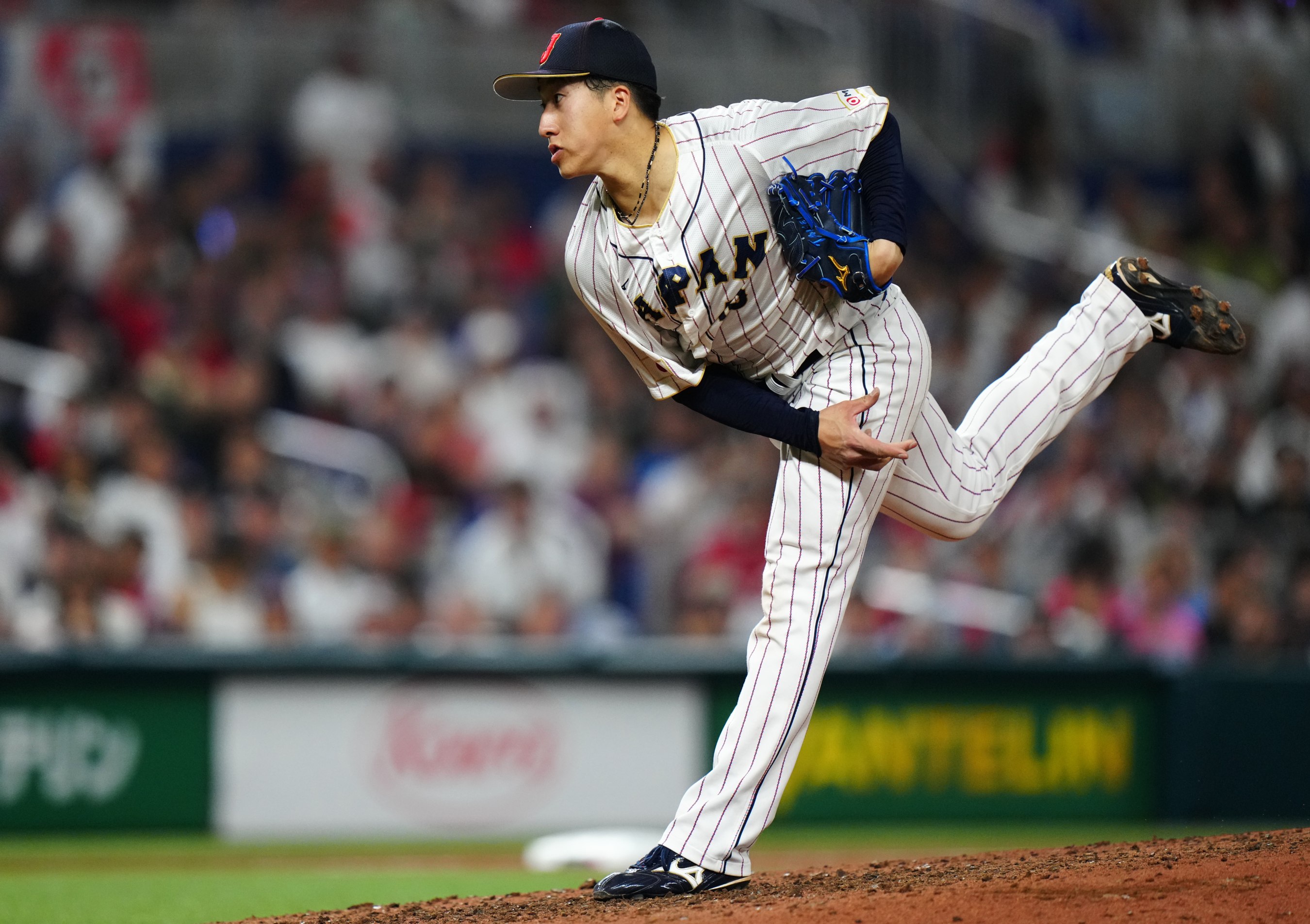Japan Uses Pitching Depth To Take Down Team USA In WBC Final


Image credit: Taisei Ota Japan (Photo by Daniel Shirey/WBCI/MLB Photos via Getty Images)
MIAMI — In a move straight out of the Rays playbook, Japan used seven different pitchers to defeat Team USA in the final of the World Baseball Classic. With a variety of pitch mixes and looks the Japanese pitching staff stymied the formidable United States lineup time and time again throughout the night.
Sinkers, sliders, high-ride four-seam fastballs, sweepers, cutters and knuckle curveballs from a variety of arm slots made it nearly impossible for the United States to get comfortable in the box.
Japan’s pitching depth and talent won out in the end and led to an undefeated championship run.
Team USA manager Mark DeRosa was impressed by the Japanese staff and deliberately managed the matchups during the game.
“They had good stuff, all of ’em that they brought in,” DeRosa said. “The sidewinder (Taisei Ota) I thought that was a tough AB for Anderson, so Jeff McNeil gets in there.”
The Japanese staff had plenty of talented players familiar to American players and baseball fans but the depth of the pitching staff even took Japanese outfielder Lars Nootbaar by surprise.
“Yeah, I actually did know how good this pitching staff was,” Nootbaar said. “I didn’t really know the depth of the bullpen, but obviously (Yu) Darvish, obviously Shohei (Ohtani), and I knew of (Roki) Sasaki and (Yoshinobu) Yamamoto prior to coming out here. Didn’t really know exactly how deep the bullpen was, like I said, but I knew we had a good chance to win it all based off of that starting pitching. Having pitching and having that depth that obviously we showed today proved to ultimately win it for us.”
The culture of Japanese baseball is rooted in the quality of pitching development and it proved to be a strength. It provided Japan’s manager Hideki Kuriyama an advantage against a star-studded American lineup. The ability to pick from a wide range of options with different looks is something Japanese baseball prides itself upon.
“What is the culture of the Japanese team? I think it’s a pitcher,” Kuriyama said. “And I think that the pitcher is the critical point. And besides Shohei, the younger pitchers are great, so I was very happy.”
After starting lefthander Shota Imanaga, Kuriyama went to 23-year-old Shosei Togo. The righthander opened the third with a strikeout of Mike Trout before inducing a flyball from Paul Goldschmidt in the very next at-bat. Togo worked out of a jam after walking the next two batters to strike out Trea Turner and end the threat in the third.
Togo worked a clean fourth inning before giving way to 20-year-old Hiroto Takahashi. The righthander opened eyes as he worked a scoreless fifth, striking out MVPs in consecutive at-bats— Trout and Goldschmidt.
After getting through five innings with the lead Kuriyama again went to the bullpen and brought out Hiromi Itoh in the sixth before going to a unique look in a low-slot righthander in Taisei Ota in the seventh. This set the stage for a deadly one-two punch composed of two of the cornerstones of Japan’s pitching-centric baseball culture—Yu Darvish and Shohei Ohtani.
Darvish allowed a home run to the second batter he faced in Kyle Schwarber before the next batter Trea Turner reached base with a single. Darvish settled in to retire the next two batters in catcher J.T. Realmuto and outfielder Cedric Mullins.
The ninth saw Ohtani, who would be named the tournament MVP, trot to the mound looking to close things out for Japan and put a bow on his storybook tournament. After allowing a leadoff walk to Jeff McNeil, Ohtani induced a ground ball from Mookie Betts, leading to a pivotal 4-6-3 double play.
With two outs up stepped Ohtani’s Angels teammate—and Team USA captain—Trout. In what is sure to become one of the biggest moments in Japanese baseball history, Ohtani struck out Trout to seal the victory for Japan.
As the old expression goes, pitching wins championships and Team Japan provided a look at the present and future of Japanese baseball’s pitching-proud culture.

Comments are closed.